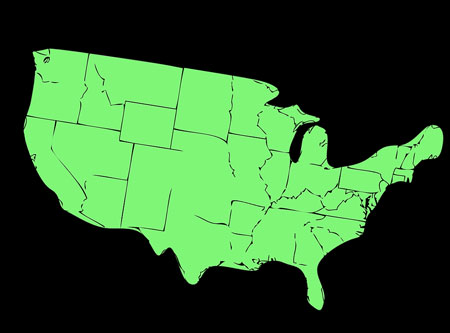



Want to know why software providers and online casino operators had to abruptly flee the U.S.? Did they do something suspicious and illegal, or were there other reasons? Our article will reveal the real reasons why casino operators and software providers fled the U.S.

So, why did many casino operators and software providers move from such a large market? Were the reasons related to the law or illegal practices? How did the government react? And, ultimately, how did it affect players and their gaming experience?
In this article, we will provide a more detailed review of online gambling, federal and state online gambling laws, casino operators, software providers and some key events. So, if you are wondering why casino operators and software providers fled the United States, you will find the answers below.
While different forms of gambling have been around for many years – even since ancient times – online gambling is relatively new. Gambling on the Internet became popular for the first time in the early 1990s.
Online gambling generally includes betting and the act of carrying out financial transactions on sports and casino games on online gambling sites. There are different kinds of online gambling, but in most cases, players play at online casinos or bet on gambling websites. There, players can bet on and play virtual versions of poker, slots, classic table games, sports, lotteries, bingo, etc. Literally thousands of gamblers can play on their computers at home or even via their portable devices while traveling.
In general, online gambling puts the Las Vegas or Atlantic City experience at players’ fingertips, due to the large amount of money involved, and that can raise a lot of concerns due to taxes, bank transactions and other legal matters.
Even though the online gambling industry is only a few decades old, its legal aspects have been incredibly controversial for many countries around the world. In fact, most of the old gaming laws regulate and pertain only to land-based gambling. Many countries have had to adopt new rules for online gambling activities. And that’s where some countries, especially the U.S., have faced difficulties.
To understand why casino software providers and operators left the U.S., we have to look into some laws that were created for online gambling over the years. There are some laws that state it’s illegal to play online casino games with actual money; for example, Louisiana and Washington have strict restrictions against it. On the other hand, New York and New Jersey are among the four states where such forms of entertainment are not banned. However, players can gamble only in those states, and the law doesn’t allow intrastate gambling.
As the law is a bit flawed, there are quite a lot of loopholes. So, what kind of laws are in place regarding online gambling for Americans?

The Wire Act was implemented way back in 1961, which means it is not well adapted for online gambling. And for many years, it was unclear if the act applied to all forms of wagering or only sports betting. Moreover, in 2002, 2011 and, more recently, in 2019, the Department of Justice argued that the act applies to all types of gambling, including Internet gambling. It proclaims the activity illegal in the U.S., but its future still remains uncertain.
The Unlawful Internet Gambling Enforcement Act, established in 2006, aims to prohibit financial transactions for online gambling and betting through U.S. banks. What’s more, the Act sets out to ban all forms of intrastate gambling, which is one of the main reasons why things have changed a lot for U.S. players.
People consider the early 2000s to be the Wild West period of online gambling. Back then, the rules of the gaming industry weren’t fully established, and a lot of gray market websites were operating in the country.
What’s more, there was a big poker boom at the beginning of the decade. While thousands of Americans played games and spent money at online casinos, some U.S. operators and casino groups started exploiting the industry. Many online gambling websites used shady marketing tactics, including TV advertising. These casinos convinced players that their sites were completely safe, but it turned out not to be true. Sites like Absolute Poker managed to dodge the laws and get away with lots of money. This gambling portal (and some others) managed to steal millions of dollars from their players by using rigged software, money laundering and other illegal practices.
Essentially, the UIGEA was established to ban American banks from carrying out transactions for gambling sites that catered to the U.S. market.
However, since the new law was flawed, it couldn’t protect all players. The Department of Justice managed to forcefully close down Absolute Poker and other sites, such as Full Tilt and Ultimate Poker. While the DOJ managed to expose the fraudulent websites and their tactics, thousands of users were left to their own devices. The UIGEA was enacted on April 15, 2011, a day now known as the Black Friday of the gambling industry.
After all, these gambling sites could not return the money to their players. Some sites also used players’ winnings to pay for their marketing campaigns and operational costs. These casinos simply didn’t have the funds to pay fines and cash players out, and thousands of users were left with frozen accounts. In fact, years passed before the casinos started to take any action. In 2017, some reports claimed that the casinos finally started to pay out the winnings that their customers should have received a long time ago.
When the UIGEA prohibited all types of online gambling, the casino operators and software providers had to think of a quick-fix solution. They needed to keep their businesses from falling apart. So, let’s look at software providers and casino operators in more detail.
The operators of online gambling sites, also called iGaming operators, are, generally, in charge of running a gambling site. They work with affiliate programs for marketing, regulatory bodies to ensure safe play, independent auditors that test the casino games and with game/software providers.
Additionally, the operators are usually the owners of a casino or a group of casinos. They also set the rules of their site(s), determine the design and work with finances. They make the decisions, and it is their responsibility to create a safe site which doesn’t harm players.
Software providers, on the other hand, are companies that create and supply online casinos with games or other software. They design games, determine how they pay, set jackpots, and ensure that their games are fair.
Providers develop everything from casino games, sportsbooks and racebooks, but they can also supply full software platforms. They can even design entire casinos and their desktop or mobile software. In some cases, gambling software companies also determine the payment options if their software is licensed by legal jurisdiction.
For example, Microgaming was one of the first providers, and they’ve supplied games for the Gaming Club casino site and their operator. Although the industry experienced a huge expansion by the late 1990s, the UIGEA took a big turn in the 2000s.
Essentially, the UIGEA prohibited all types of online gambling on U.S. territory. It was a severely harsh law which impacted both the providers and the operators. The act prohibited gambling operators from processing payments. Plus, they could no longer market their companies in the media.
Ultimately, it meant that the online casino operators couldn’t make money and allow U.S. residents to play for real money.
But most operators and providers found a loophole in the law. They moved into a gray zone, and it saved their businesses. Namely, the operators and providers simply moved offshore to places like Costa Rica, Curaçao, Malta and many more.

and were able to do business under the laws of the country in which they were based and could thus accept American players. Essentially, the operators and providers found a way to bypass the UIGEA regulations.
But does that make them safe and trustworthy?
Well, while the term “offshore” may certainly sound negative, offshore gambling is currently the only method for most Americans.
These casinos allow U.S. players to make deposits and withdrawals with different payment processors. However, there are some risks because many casinos may be unregulated. The laws of the jurisdictions and gaming regulatory bodies are not so strict. Many operators have found ways to exploit the rules to their benefit. To the detriment of their players, offshore operators and casinos can:
As you can see, this list is quite long, but there are many more ways in which an online casino can harm its players. If you are a U.S. player who knows how to find reliable sites, offshore casinos won’t harm you.
Many reputable operators and providers were forced to move due to U.S. law, but they have remained trustworthy and still continue to work with strong business ethics and a great reputation.
Luckily, it’s not that hard to find reliable casinos. U.S. players simply need to look online and browse reviews, as well as user comments, to see if a casino site is safe.
Some traits of a safe casino are a license from a respected jurisdiction and SSL encryption. It should also contain a certificate of audited games and software (e.g., eCOGRA). Plus, respected casinos work together with agencies such as GambleAware. These agencies promote responsible online gaming and address problem gambling. To determine whether a site is safe, players should look for this information on the casino website, where it should be clearly displayed. And if you want to know which offshore casinos are dangerous, there is a quick way to find out; namely, you can inspect online blacklists. These lists contain the names of rogue casinos and often provide reasons why those casinos are unsafe.
Players should also look for a neatly designed and user-friendly casino platform, recognizable transaction methods for withdrawals and deposits and the services of the customer support team.
So, now that you know why software providers and casino operators have fled the U.S., you can proceed with your gambling activities safely. These providers and operators have turned to jurisdictions where different laws apply and allow online gambling.
Therefore, gambling on offshore sites is legal for U.S. players and there is no reason for concern. It was a clever way to keep casino businesses running, and without the move, it’s possible that the industry would not have survived. U.S. laws are still very strict but complicated, so it’s possible that things could change in the near future.
Plenty of casino providers and operators that moved to offshore territories are reliable and safe. If you pick a trustworthy casino, you will not be harmed, and you will not violate U.S. law. So, be on the lookout for U.S.-friendly casinos, research them before you play and good luck!

The original purpose of beacons was to warn about enemy invasion using light signals, which could be seen for many miles; or to warn approaching ships that land was near. In modern times, the word “beacon” has acquired a slightly different meaning because it is now primarily associated with digital technologies. Innovations are changing the […]
When you go to a party, you will always spot ‘classy,’ ‘non-classy,’ ‘easily-drunk’ type of people. It works the same whenever you play poker — you always meet a variety of personalities at the poker table. Some of them are easy to beat, while others are strong enough to defeat you instead! But here, we’re […]
There are a lot of things we need to be aware of before playing in online casinos; especially if we’re talking about slot machines. If you’re going to put effort and money into some of these games, you’ll probably want them to be fair and safe. Let’s explore the biggest fears gamblers experience when they […]
Flopping top pair out of position isn’t as bad as flopping air out of position. But it can still be a lot more expensive if you’re not careful. Why? Remember: being out of position puts you at a huge disadvantage vis-a-vis your opponent, by forcing you to play the role of initiating, rather than reacting, […]
If you love gambling and have been to a land-based casino at least once, you may have thought about becoming a dealer. Playing the same game but from the opposite side, while communicating with other players, sounds like a dream job, right? A dealer is a straightforward job, and you will be the heart and […]
On Monday September 14, MGM announced that it plans to open its first smoke-free casino at the end of September, when Park MGM will finally reopen its venues to players and tourists. The resort comprises around 2,990 rooms and various restaurants, and it’s set to be reopened on September 30. The venue has been closed […]
Online gambling has undoubtedly taken a place of true supremacy over the casino industry during the pandemic. And the reason for that is quite clear: online casinos are more accessible, and you can always count on some encouragement from the casino administration to help you boost your game. However, this digital revolution has only been […]
The large selection of online gambling sites out there can make players somewhat puzzled, and give them a feeling of uncertainty about making the right choice of casino. Each online gambling venue offers its own conditions, games, and various bonuses, of course; but the most important thing is the reliability of the casino and the […]